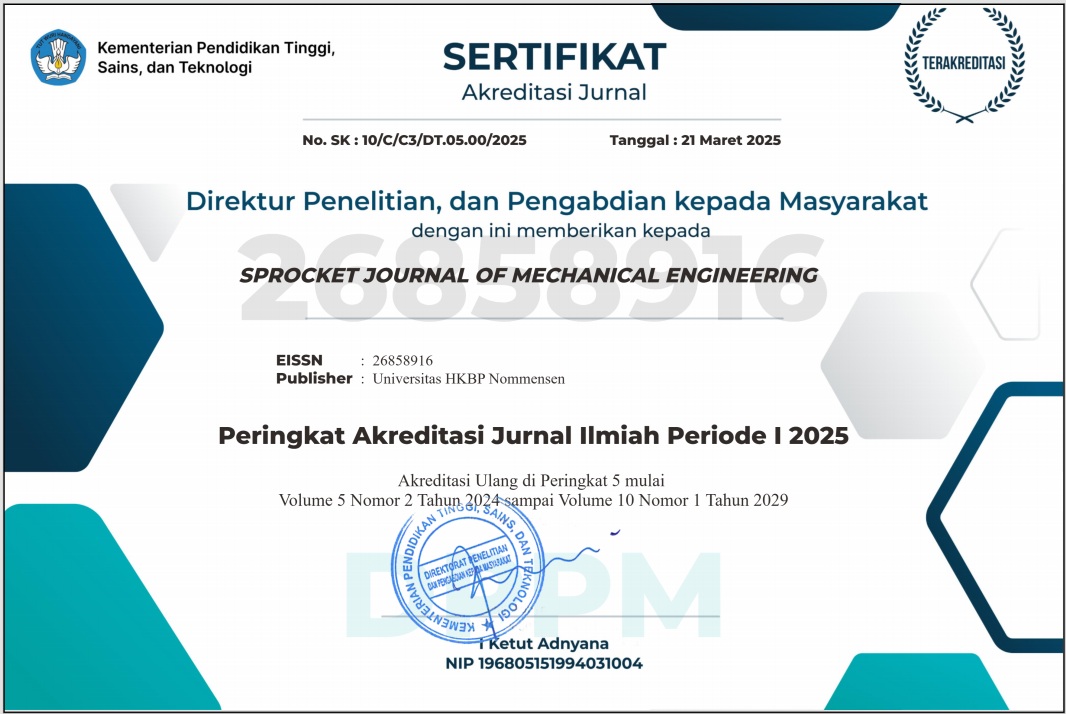Pengaruh Bahan Bakar Biodiesel dari Dimetil Ester Terhadap Kinerja Mesin Diesel Empat Langkah
Abstract
This study aims to determine the effect of biodiesel fuel from dimethyl ester on four-stroke stationary diesel engines' performance and exhaust emissions. Tests were carried out using B10 and B30 fuels with engine speed variations and load variations without modifying the engine. The results showed that the torque, power, and thermal efficiency tended to decrease when using B10 and B30. In addition, the specific fuel consumption has increased when the engine uses B10 and B30. But exhaust emissions of CO and unburned hydrocarbon (UHC) decreased NOx and increased CO2 when the engine uses B10 and B30. This research also obtains the correlations and regression equations involving engine performance parameters.
References
[2] A. G. Olabi, D. Maizak, and T. Wilberforce, “Review of the regulations and techniques to eliminate toxic emissions from diesel engine cars,” Sci. Total Environ., vol. 748, p. 141249, 2020, doi: 10.1016/j.scitotenv.2020.141249.
[3] J. Yuan and X. Luo, “Regional energy security performance evaluation in China using MTGS and SPA-TOPSIS,” Sci. Total Environ., vol. 696, 2019, doi: 10.1016/j.scitotenv.2019.133817.
[4] S. N. Gebremariam and J. M. Marchetti, “Economics of biodiesel production: Review,” Energy Convers. Manag., vol. 168, pp. 74–84, 2018, doi: 10.1016/j.enconman.2018.05.002.
[5] X. Zhou and C. Feng, “The impact of environmental regulation on fossil energy consumption in China: Direct and indirect effects,” J. Clean. Prod., vol. 142, pp. 3174–3183, 2017, doi: 10.1016/j.jclepro.2016.10.152.
[6] S. Dharma, H. C. Ong, H. H. Masjuki, A. H. Sebayang, and A. S. Silitonga, “An overview of engine durability and compatibility using biodiesel–bioethanol–diesel blends in compression-ignition engines,” Energy Convers. Manag., vol. 128, pp. 66–81, 2016, doi: https://doi.org/10.1016/j.enconman.2016.08.072.
[7] J. M. Marchetti, “A summary of the available technologies for biodiesel production based on a comparison of different feedstock’s properties,” Process Saf. Environ. Prot., vol. 90, no. 3, pp. 157–163, 2012, doi: 10.1016/j.psep.2011.06.010.
[8] F. Yaşar, “Comparision of fuel properties of biodiesel fuels produced from different oils to determine the most suitable feedstock type,” Fuel, vol. 264, 2020, doi: 10.1016/j.fuel.2019.116817.
[9] T. B. Sitorus, F. Ariani, and Z. Lubis, “Efek Bahan Bakar Biodiesel Dari Minyak Kedelai Terhadap Emisi Gas Buang Dan Temperatur Ruang Bakar Mesin Diesel,” Simetris J. Tek. Mesin, Elektro dan Ilmu Komput., vol. 9, no. 2, pp. 1083–1090, 2018, doi: 10.24176/simet.v9i2.2569.
[10] D. Singh et al., “A comprehensive review of biodiesel production from waste cooking oil and its use as fuel in compression ignition engines: 3rd generation cleaner feedstock,” J. Clean. Prod., vol. 307, no. May 2020, p. 127299, 2021, doi: 10.1016/j.jclepro.2021.127299.
[11] T. N. Verma et al., “A comprehensive review of the influence of physicochemical properties of biodiesel on combustion characteristics, engine performance and emissions,” J. Traffic Transp. Eng. (English Ed., vol. 8, no. 4, pp. 510–533, 2021, doi: 10.1016/j.jtte.2021.04.006.
[12] W. W. Pulkrabek, “Engineering Fundamentals of the Internal Combustion Engine, 2nd Ed.,” J. Eng. Gas Turbines Power, vol. 126, no. 1, pp. 198–198, 2004, doi: 10.1115/1.1669459.
[13] John B. Heywood., “Internal combustion engine fundamentals,” Choice Rev. Online, vol. 26, no. 02, pp. 26-0943-26–0943, 1988, doi: 10.5860/choice.26-0943.
[14] Q. Tong et al., “Experimental studies of combustion and emission characteristics of diesel engine fueled with diesel/cyclopentanone blend,” Energy Reports, vol. 7, pp. 6756–6768, 2021, doi: 10.1016/j.egyr.2021.09.155.
[15] Q. Ma, Q. Zhang, J. Liang, and C. Yang, “The performance and emissions characteristics of diesel/biodiesel/alcohol blends in a diesel engine,” Energy Reports, vol. 7, pp. 1016–1024, 2021, doi: 10.1016/j.egyr.2021.02.027.

This work is licensed under a Creative Commons Attribution 4.0 International License.
Penulis yang menerbitkan dengan SPROCKET JOURNAL OF MECHANICAL ENGINEERING menyetujui ketentuan berikut :
- Penulis memegang hak cipta dan memberikan jurnal hak penerbitan pertama dengan karya yang dilisensikan secara bersamaan di bawah Lisensi Internasional Creative Commons Atribusi 4.0 . yang memungkinkan orang lain untuk berbagi karya tersebut dengan pengakuan atas kepengarangan karya dan penerbitan awal dalam jurnal ini.
- Penulis dapat membuat pengaturan kontraktual tambahan yang terpisah untuk distribusi non-eksklusif atas versi jurnal yang diterbitkan dari suatu karya (misalnya, mempostingnya ke repositori institusional atau menerbitkannya dalam sebuah buku), dengan pengakuan atas penerbitan awalnya di jurnal ini.
- Penulis diizinkan dan didorong untuk mengunggah karya mereka secara daring (misalnya, di repositori institusi atau di situs web mereka) sebelum dan selama proses penyerahan, karena hal ini dapat mengarah pada pertukaran yang produktif, serta kutipan yang lebih awal dan lebih banyak dari karya yang diterbitkan (Lihat Pengaruh Akses Terbuka ).






.png)
.png)

